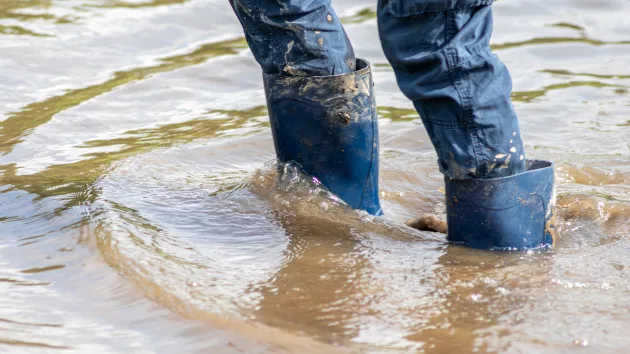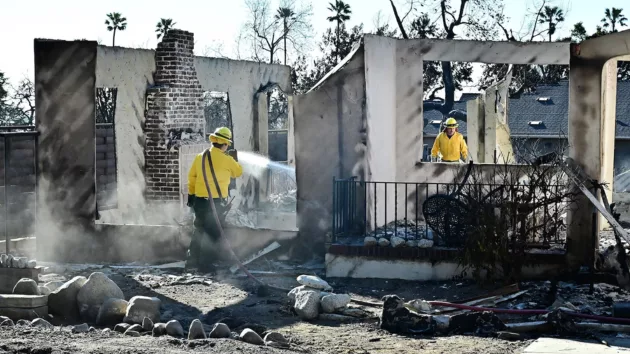(DES MOINES, Iowa) — Health experts are warning of the possibility of floodwaters containing “fecal soup” after an agriculture-heavy region in Iowa was inundated with an unprecedented amount of precipitation.
Torrential rain began falling in the Midwest last week, prompting road closures, evacuation orders, helicopter rescues and failure at some water treatment plants, according to officials.
But as the floodwaters fail to recede — and more rain on the way threatens to extend the flood event — residents in several counties in northwest Iowa are being advised to find alternative water sources, as the precipitation likely caused overflows or breaches in the manure storage basins designed to contain the waste produced by the millions of farm animals within the region’s agriculture industry, Alicia Vasto, director of water programs for the Iowa Environmental Council, told ABC News.
The five counties most affected by the floodwaters and at most risk of being contaminated with fecal soup — animal feces mixed with water — are Clay, Emmet, Lyon, Plymouth, and Sioux, according to officials. The region is known for its heavy agricultural industry, the ample manure from which is now contaminating the standing water even further, according to a statement by Food and Water Watch, and environmental watchdog group.
The affected counties are home to more than 900 factory farms that produce about 23.6 billion pounds of animal waste annually — 175 times the human waste that is produced in all five counties, according to the group. The region has a high concentration of animal feeding operations, and the manure is stored in basins or lagoons that can be overtopped when too much rain falls in too little time, Vasto said.
“A lot of these facilities that have these large manure storage systems, and there’s a lot of potential for water contamination,” Vasto said.
The floodwaters have breached manure pits and lagoons, flushing animal feces and urine — as well as bacteria, parasites, viruses and nitrates — into waterways that supply the region’s drinking water, the environmental group said.
The rain fell fast and furiously. Precipitation that began on June 21 measured at 15 inches in some regions just two days later, Iowa Gov. Kim Reynold told reporters on Sunday. President Joe Biden declared a state of emergency in Iowa on Monday.
The severe weather continued into Tuesday night, with more tornado warnings, flash flooding and large hail affecting the Midwest.
Since then, floodwaters contaminated with fecal soup have been flowing into people’s homes as well as the waterways, Vasto said.
“It’s creating this disgusting mess that will be really difficult to clean up and is really toxic and dangerous for folks,” she said.
Health experts are even more concerned about the water systems since the floodwaters have not yet receded, Vasto said. Human fecal matter is likely in the mix as well, since water treatment plants failed and untreated raw sewage is flowing into waterways, she added.
Not only is the drinking water not safe, but neither is swimming or boating in the lakes and rivers in northern Iowa, where runoff from the fecal soup has likely spread, the Iowa Department of Natural Resources said in a press release on Thursday.
Humans who come into contact with or consume manure-contaminated flood water are at increased risk of contracting waterborne illnesses, including E. coli infections and Giardia infections, according to Food and Water Watch. Drinking nitrate contaminated water is linked to birth defects and several types of cancers, the group said.
Residents affected by the floodwaters “must remain on constant guard against the threat of animal waste,” Amanda Starbuck, director of Food and Water Watch, said in a statement.
Elsewhere in the state, floodwaters that spilled over the Big Sioux River levee near Sioux City, Iowa, damaged hundreds of homes and have prompted the local wastewater treatment plant to dump about a million gallons of untreated sewage per day into the Missouri River, The Associated Press reported.
Northwest Iowa was not the only region affected by the heavy rain. Nebraska, South Dakota and Minnesota — where the Rapidan Dam on the Blue Earth River is at risk of failure — have been under siege from severe flooding as well.
The flooding was so severe that a home teetering on the edge of the riverbank collapsed into the rising waters, images show.
This is not the first time fecal soup has affected northwest Iowa. In 2018, flooding caused manure overflows at 28 livestock operations. When Hurricane Florence struck eastern North Carolina in 2018, the flooding caused dozens of manure lagoons to overflow or breach entirely and flood fecal soup into homes and neighborhoods, according to Food and Water Watch. Thousands of hogs died in that event as well, the watchdog group said.
In the long term, the industry will need to rely on much larger manure storage systems that can handle the amount of precipitation that fell in the past week, Vasto said. In addition, lawmakers must start regulating pollution from the agriculture agency, Starbuck said.
“It takes more than disaster declarations to keep Iowans safe,” Starbuck said.
Copyright © 2024, ABC Audio. All rights reserved.






